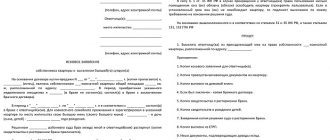Is it possible to discharge a person without his presence?
applications for deregistration at the place of residence free of charge in word format
Remember! A tenant registered in an apartment can be evicted in his absence in the following cases:
- the tenant registered in the apartment will be registered at a different address,
- an authorized person acts on behalf of a registered citizen (using a notarized power of attorney),
- discharge occurs on the basis of a court order.
There are many situations when a person cannot personally appear at the FMS office and be discharged from a residential premises.
For example, he could move to another city or country, be drafted into the army, serve a sentence in prison, undergo inpatient treatment, etc.
To submit an application for an extract, you can send it by mail or use the State Services portal.
If a trusted person acts on behalf of the tenant being discharged, the document confirming his right to represent the interests of another person must be certified by a notary. The power of attorney states that the person has the right to deregister a specific person. In addition, the application for an extract must also be certified by a notary.
For an extract made through a proxy, you will need:
- passports of the tenant and his representative,
- power of attorney,
- application for discharge.
There are no other options for discharge without the presence of the resident. But in some situations a power of attorney is not required. We will talk about such cases later.
Discharge of a resident without his presence
Articles 209, 288 and 292 of the Civil Code of the Russian Federation provide for the rights of the owner to housing, namely: use, disposal, possession.
These rights are exercised by the citizen who owns the property in accordance with the purpose of the residential or non-residential space. Moreover, the owner can either personally reside in the apartment or house, or settle (register) his relatives or third parties in it.
The owner can expel people from the apartment with or without their consent (by court decision).
In the first case - by agreement of the parties - no problems arise. If a citizen does not want to voluntarily check out, and he has lost the right to use housing, the owner goes to court with a claim, in which he indicates the reason for deregistration.
There are certain nuances when checking out different categories of people from housing:
- It is easy to write out your ex-spouse if the apartment was purchased by the husband or wife before the marriage. One of the spouses automatically loses the right of residence after a divorce, which is enshrined in Art. 31 of the Housing Code of the Russian Federation.
- To remove a minor child from an apartment, you must obtain permission from the guardianship and trusteeship authorities. This government body considers each case individually and monitors compliance with the rights of the child when changing place of residence.
- The owner can deregister a person who is serving a sentence in prison according to a court verdict. However, upon release, the latter has the right to register in this apartment.
- Also, the owner can discharge the tenants (even without their consent) if he became the owner of the apartment by inheritance, as a result of a donation.
All other cases of forced deregistration are considered by the court individually.
The owner of an apartment can register a person in it with the consent (written) of all owners of this premises. The exception is a child - he is automatically registered at the place of registration of one of the parents without obtaining permission from the owner.
We invite you to familiarize yourself with: Sample apartment spill report
If there is only one owner of an apartment, he can register any person in it, even without the knowledge of the citizens living in it.
Forced eviction from the owner's apartment occurs by court decision. That is, the owner must file a corresponding statement of claim, which indicates the reason for deregistration.
In this case, you must provide the following documents:
- documents confirming housing rights;
- passport;
- receipt of payment of state duty.
With the decision, if the court has issued one, the owner goes to the passport office and discharges the citizen without his consent.
In any case, we must strive for a pre-trial, that is, amicable settlement of the dispute. Legal costs are usually high, and proceedings take a lot of time.
If a citizen does not live in the apartment for a long time, ask him to issue a power of attorney for deregistration. If he maliciously violates the living conditions, have a conversation. A peaceful resolution of the dispute will save the owner money and effort.
When the need arises
The need to deregister at your place of residence arises for a variety of reasons.
Attention! We offer a list of the most common of them:
- Home sales. If the owner of an apartment sells it, then all persons registered in this living space must be registered. The new owner, having paid for the purchase, receives housing without residents registered there. His right is to register his family members and other citizens there. Also, residents are evicted from the apartment if the apartment is exchanged or if the creditor takes it for debts,
- The apartment is an object of donation. A person who gives his apartment to another person may not be discharged from it, this is his legal right, but other citizens must be discharged from it,
- Inheritance of residential real estate. When an apartment has become the property of another person by right of inheritance, he has the right to write out all the tenants registered in his apartment. The exception is minor citizens
- Deprivatization procedure. Although such a procedure is rare, the transfer of privatized housing into state ownership has its own rules. All residents, together with the owner, are discharged, but when drawing up a rental agreement, they can register in the apartment again. Only the owner will no longer own this property, he will be the tenant of the property,
- Change of place of residence. If a person moves, he needs to leave his previous place of registration. This also applies to moving within the same city or region,
- Temporary change of residence. If a person moves to another place of residence for a period of more than 90 days, he needs to deregister at his previous place of residence and apply for temporary registration at a new place of residence. If you do not obtain a temporary registration, this is fraught with punishment, since such actions are a violation of the law,
- Forced eviction. Sometimes a tenant is discharged from housing not because he wants to, but because other residents of the apartment demand it. This situation arises if a person, not being the owner of the apartment, behaves inappropriately and does not comply with the rules of the hostel. A negligent tenant can be forcibly evicted and deregistered by a court decision.
Please note! Some nuances:
- Any tenant can be evicted and forcibly discharged with the consent of all owners of the apartment, if this tenant is not the owner of the apartment or his relative,
- It is impossible to evict and deregister children under the age of majority unless there is the consent of their parents or legal representatives,
- It is almost impossible to evict the owner of the apartment, even with the help of the court. In this case, neither his behavior nor his actions matter,
- Removal from temporary registration is possible without the presence of the tenant, if such a condition is specified in the lease agreement.
Extract from an apartment with debts
When checking out an apartment with debts, you need to prepare documents. The standard list consists of a passport and an application for discharge from an apartment (form No. 6). But this is only if you intend to deregister. We talk about all the nuances in a separate article, which concerns the list of documents for removing a person from an apartment.
- Every citizen of our country has the right to choose their place of residence (Article 27 of the Constitution of the Russian Federation). In addition, nothing is said about debts - this is the first point.
- Decree of the Government of the Russian Federation No. 715 of March 15, 2015 gives an idea of the registration of citizens (extract and registration). There is no information on the prohibition of discharging a person with debts - the second point.
- The obligation to pay rent and utilities is regulated by the Housing Code (Clause 1, Article 153 of the Housing Code of the Russian Federation). There are no restrictions on discharge in the presence of debts - the third point.
Extract by power of attorney
If you do not have the opportunity to deregister yourself, issue a power of attorney. Based on this document, you can deregister a person or register him without personal presence.
It is not difficult to make this document, but compelling reasons will be required to carry out these procedures without your participation.
Do not rush to issue a power of attorney. First of all, consult on this issue with the authority that deals with the registration and deregistration of citizens.
In addition to the power of attorney, the passport of the interested person will be required for registration.
To correctly draw up such a power of attorney, you need to find a sample of it. It is available on various sites on the Internet or in the authority that deals with issues of registration of citizens.
Please note that not every service enthusiastically responds to a request to register or write out a person by proxy. This is due to the increasing incidence of fraud in residential real estate. Often this is the method used to try to discharge “unnecessary” residents. There is no particular difficulty in preparing documents for discharge, which is what “enterprising” citizens take advantage of.
How to quickly and legally expel your ex-husband from your apartment?
How to register a person by power of attorney
Just as in the case of registration without the presence of the owner, this registration procedure must be carried out using a power of attorney, which is executed by a notary. If necessary, he can be invited to your home. If a citizen cannot independently put his signature on a document, a hand applicator is invited.
- First, the citizen must be discharged from his previous place of residence;
- issue a power of attorney on behalf of the owner to the authorized person, which confirms the ability to carry out actions related to registration on behalf of the owner;
- contact the Federal Migration Service and fill out an application on unified form No. 6 and an arrival slip, which can be obtained from the registrar. Samples of filling out the application are available on the information boards;
- provide the documents necessary for registration;
- then the registrar will keep the passport of the person registering and set a date when it can be received with a registration stamp;
- On the appointed day you need to pick up your passport.
We recommend reading: Where to Register a Land Purchase and Sale Agreement
Power of attorney: registration
general power of attorney free in word format
There is a certain procedure for issuing a power of attorney. It was already mentioned earlier that the power of attorney must be certified by a notary. To do this, the resident and his representative must contact a notary office. The specialist will draw up this document and register it.
The power of attorney contains the following information:
- Information about the person whose interests are represented by the authorized person (full name, passport details, residential address),
- Information about the resident’s representative (full name, address, passport details),
- The list of actions that the principal instructs his representative to perform,
- Duration of the power of attorney,
- Certification by a notary.
When drawing up a power of attorney, both the principal and his authorized representative must be present.
Where to apply and go, how and where you can check out of the apartment: passport office or FMS
Previously, the FMS and local administrative institutions could register and deregister. Residents could contact administrative authorities in those settlements where there were no regional offices of the FMS. According to the decree of January 1, 2014, the registration authorities in the Russian Federation are only the FMS.
- MFC. The procedures for discharge through the multifunctional center are practically no different from discharge to the Federal Migration Service. In the same way, an application is written in form No. 6 and a passport is handed in.
- Portal "Government Services". In order to use the portal, registration is required. On the website, select the “Federal Migration Service” section and the “Registration of Citizens” subsection.
Necessary documents for a person's discharge
The list of documents that must be submitted to the relevant authority for discharge may differ depending on the situation and reasons for discharge.
If the tenant agrees to the discharge, the following will be required:
- Application (drawn up according to the sample). The following information is indicated in the appeal:
- name of the organ,
- personal data of the applicant (full name, passport details),
- reasons for deregistration,
- signature,
- Date of preparation.
- Identification document of the person who will handle the discharge.
Notice! If we are talking about a trusted person, then you will need:
- a statement made by the resident,
- notarized power of attorney,
- passport or other document confirming the identity of the authorized person.
If the discharge is carried out by the owner of the property without the presence of the tenant or without his consent to the discharge, the following will be required:
- statement,
- passport,
- a court decision to remove the citizen from the apartment.
Watch the video. How to discharge a person from an apartment without his consent?
What factors need to be taken into account when making such a decision?
The owner of private or municipal residential real estate can register any citizen legally located in the territory of the Russian Federation. This is guaranteed by Art. 35 of the Constitution, where the concept of private property is revealed. However, it will not be possible to discharge a tenant with the same ease, since Art. Article 40 of the Constitution states that no one can be arbitrarily deprived of their home.
This is the main difficulty: everything must be done so that the interests of neither party are harmed.
The course of action depends on the nature of the situation as a whole , so an apartment owner who wants and can discharge a non-tenant must take into account the following factors:
- who is to be discharged : ex-spouse, minor child, rowdy relative, previous tenants, etc.;
- voluntary or forced ;
- does the person being discharged have other housing? The fact is that it is impossible to force someone to be discharged “to nowhere”. If the financial situation or other circumstances do not allow the defendant to acquire a new home, then the law obliges the plaintiff to postpone the eviction or, at his own expense, temporarily provide him with a place to live (Chapter 5, Article 31 of the Housing Code of the Russian Federation);
- grounds for discharge. This determines what certificates and documents you will need to obtain, and how great the chances of success are;
- type of ownership in which the property is located (municipal or private).
Reference! Only the owner or tenant can go to court if we are talking about municipal property. The law does not prohibit other interested citizens from doing this, but they will have to confirm their right to file a claim.
We have provided more nuances about whether it is possible to eject a person from an apartment without his consent if he is the owner or if the owner wants to eject him.
Extract using the State Services website
If you need to discharge a person from an apartment without his presence, it is not necessary to go to a special authority. You can do this without leaving your home on the State Services website. Only the owner of the property has this right.
Remember! How to do it:
- go to the website https://gosuslugi.ru,
- go to your personal account, fill in the required fields with information from the main documents, register,
- the site will check the information received,
- If all the information is confirmed, you can proceed further,
- go to the appropriate section and upload documents in electronic form,
- After some time, you will be given a date to visit the accounting authority in your region.
If the meeting time is communicated, go to the appropriate authority. You must have original documents with you. This service will directly deregister a citizen without his participation.
There are no difficulties with deregistration of residents who do not belong to the category of minors and are not the owners of this property. There are many legal ways to do this without the tenant present.
Attention! Our qualified lawyers will assist you free of charge and around the clock on any issues. Find out more here.
Is it possible to check out of an apartment without personal presence in Russia in 2021?
- conscription into the army;
- death or a court decision declaring a citizen dead;
- recognition of a person as missing;
- identification of violations and errors in documents that were the basis for registering a person.
long term imprisonment;
Through the portal you can submit an online application for discharge from housing. However, to finalize the deregistration, you will need to appear in person at the passport office or have a representative with a notarized power of attorney who will issue the deregistration on your behalf.
How to discharge a person from an apartment through the court
If a person does not want to leave the apartment on his own, he will be discharged without consent. This can be done through the court.
File a statement of claim in court. The following documents must be attached to it:
- passport of a citizen of the Russian Federation,
- papers confirming the right of ownership of housing (certificate, extract from the Unified State Register of Real Estate),
- papers indicating the method of acquiring the right to housing (will, deed of gift, purchase and sale agreement, etc.),
- other documentation directly related to the case (extracts from personal accounts, document on divorce, etc.).
Make sure that there are witnesses and that they agree to speak at the hearing (if necessary).
You can DOWNLOAD samples of statements of claim for the removal of a tenant from an apartment without his consent from the links below:
- Claim for the removal of a tenant from a privatized apartment
- Claim for the removal of a tenant from a municipal apartment
- Claim to remove ex-spouse from apartment
- Claim for removal of a minor from the apartment
- Claim for removal from an apartment of non-resident but registered persons
- Statement of claim for removal from an apartment without consent (form)
- Claim for removal of a stranger from the apartment
The claim is filed in court at the place of residence. If the court rules in your favor, the tenant will lose the right to use your living space.
Once you receive the court order, take it to the institution that deals with deregistration of citizens. This could be a Federal Migration Service office, a passport office, an MFC, etc.
Please note! In addition to the court decision, the following documents are submitted to the listed authorities:
- application for deregistration of a tenant,
- information about who is registered in this apartment,
- house register (if a tenant is being discharged from a private house).
Please note that the person being deregistered does not have to be present. The discharge result will be available in 1-3 days.
How can the owner of an apartment register the persons registered in it?
Are people formally “listed” in the premises who have not lived there for a long time, or persons who are not related to the owner in any way? In this case, the problem of how the apartment owner can register the persons registered in it often turns into a headache for him. Here is a real life situation.
I recently bought an apartment. When re-registering the personal account in my name, I learned that the former owners still retain their registration in my residential premises. I heard that they can be discharged through the court. Please give me advice on how to do this correctly? Alexander, Izhevsk.
Is it possible to check a person out of an apartment without his consent?
If you look at the norms of the legislation that exists today, you can find several reasons why the current owner of an apartment can begin the procedure of removing unwanted people from his own living space. However, at the moment, it is possible to discharge a person without his consent only by a court decision.
What are the grounds for deregistration?
The first of them is that the people registered in the apartment are not connected by any family ties with its current owner. For example, a person inherited an apartment with a “load” in the form of people registered in it, or the previous owners did not deregister. Then the discharge of this or that person can be carried out in court without any special obstacles.
The second reason for forcibly removing a person from an apartment may be the termination of relations between spouses. For example, a recent family member remains to live in the personal apartment of the second spouse. We reviewed the extract from the ex-spouse’s apartment in more detail here.
The owner has the right to eject a person from an apartment who has not lived in it for a long time and has not paid utility bills for it. Here it is enough to prove that the person being discharged has another permanent living space and he vacated the disputed apartment voluntarily.
Many people have a strong opinion that the new owner of an apartment cannot remove a minor child from it. However, this rule also has its exceptions. We have already written about them in detail here. In particular, the plaintiff will need to prove that at the time of forced discharge the child has another permanent place of residence with his parent or guardian.
The situations described above concern cases where the owner of the apartment has the right to discharge a person. At the same time, there are still a number of houses where people live in non-privatized apartments. Then a person can be discharged from such housing in the event of a deliberate deterioration in his condition or use of the provided space for other purposes.
How can an apartment owner sign out a registered person without his consent?
In order to take this step, you will need to file a claim in the district court at the location of the apartment. However, before filing a claim, it is worth requesting from the Housing Office or EIRTs or another body a certificate about who is registered in the premises at a given specific point in time. If there are several such people, then all of them will act as defendants in the lawsuit. In addition, deregistering a person from an apartment today requires payment of a state fee of 300 rubles for filing a non-property claim.
The statement of claim must clearly describe the circumstances and grounds on which the owner of the apartment insists on the removal of other persons from it. It may end with demands for both eviction and deprivation of the right to use residential premises. Here everything will depend on whether the defendant continues to live in the disputed apartment or not. For example, if the parties to the process continue to live together under the same roof (as is the case with former spouses), then the claim can raise the issue of both eviction and deprivation of rights to use the premises.
In most cases, the question of how to remove those registered from an apartment requires serious consideration from the owner. Here you will need to collect the necessary documents, testimonies of neighbors and other evidence. All of them must be attached to the statement of claim. In addition, if the apartment is currently empty, you can take photographs to confirm that the former owners’ belongings are not in it.
If the claim is satisfied, the court decision that has entered into force should be referred to the local authority of the federal migration service. Based on it, the defendants will be deregistered at a specific address.
In real life, the issue of deregistration becomes fraught with legal complexities and unforeseen complications of the situation. Constant contact with Legal specialists will help prevent them. We will provide a detailed analysis of the situation from the very beginning and draw up a competent statement of claim to evict a person from an apartment online or after directly contacting the Legal Office.
housing disputes real estate
How to check out from another city
If you have moved to another city and want to register at your new place of residence, then there should be no difficulties with registration. These two procedures can be done simultaneously.
Important! The following must be submitted to the registration authority at the new place of residence:
- documentation for new housing (sale and purchase agreement, will, lease agreement, etc.),
- consent of the owners of the housing where you are registering (if you are renting it),
- consent of the responsible tenant, if the housing is the property of the state.
Please note that in this case we are talking only about permanent residence and not about temporary registration.
If you register and deregister at the same time, then in the application for registration you need to fill out the lower part, which concerns deregistration at your previous place of residence. The state fee is not paid upon discharge.
Registration period after discharge.
Within three days you will be deregistered at your old address and registered in another city at a new address. The passport contains a note about the extract and registration at the same time.
Your application for discharge is sent to the Federal Migration Service at your old place of residence. Sometimes a person needs an extract, but he is in no hurry to register.
How to file a claim
The first stage is collecting evidence. The plaintiff will have to convince the judges that the defendant has no legal basis to use the disputed property, but does not want to vacate it voluntarily. To do this, you need to obtain documentary evidence. Certificates may vary depending on each specific case.
The person being discharged lives in another place: utility bills paid by the owner, a certificate of the amount of debt, testimony of witnesses. If the exact address is known, you can send a registered letter demanding that you sign out voluntarily.
In case of divorce: a divorce certificate and papers indicating that the property was purchased or privatized by the owner before marriage. In addition, you can provide documents confirming that the apartment was received as a gift or by inheritance. According to Art. 61 of the Family Code, such property is not jointly acquired;
A person behaves antisocially: testimony from neighbors, certificates from doctors and from the local police officer.
The second stage is the actual preparation of the application. The document must necessarily indicate the name of the judicial authority, the details of the parties, the intended purpose of the claim (recognizing the defendant as having lost the legal basis to reside in the disputed living space).
What follows is a descriptive part: how, when and by whom the apartment was received, what are the rights of the plaintiff and the defendant, was it offered to be discharged voluntarily, are there any special circumstances, for example, the sale of real estate in order to receive money for expensive treatment . Then the essence of the current situation is stated, indicating legally significant facts, which will become the basis for the discharge.
The final part of the document is the plaintiff’s demand to recognize the defendant as having lost the right to use housing, as well as a request to call witnesses indicating their contact information.
Sample statement of claim.
As an attachment, the claim is accompanied by copies of the following certificates and documents:
- a copy of the applicant's passport;
- papers for the apartment (certificate of ownership, purchase and sale agreement, social tenancy agreement for municipal real estate);
- receipt of payment of state duty (the amount will be 200 rubles);
- evidence collected before filing a claim.
The claim and all attached certificates must be prepared in several copies: one for the court, the plaintiff and each of the defendants, if several people are to be discharged.
Watch a video that shows how to correctly draft a statement of claim.
Discharge of a person who has not lived in residential premises for a long time
Sometimes people do not live in the apartment where they are registered for a long time. If the homeowner knows where this person is, then the issue of discharge can be resolved peacefully. An application for discharge is drawn up and submitted to the appropriate authority. In this case, there will be no difficulties, as well as questions from FMS employees.
But such issues are not always resolved peacefully. If a tenant who has not lived at his place of registration for a long time does not want to be discharged on his own, he will be deregistered through the court. The claim requests the discharge of a tenant who has not lived at his place of registration for a long time.
If you need to discharge your child
Another question is if we are talking about discharging a child. The application can also be submitted through State Services, but there are a number of nuances. For example, if a child is under 14 years old, he must be registered with one of the parents. That is, it is impossible to register him, but it is impossible to leave the parent (or he needs to be registered with another parent).
It is impossible to discharge a minor anywhere, the only exception is discharge by court decision. Therefore, you must immediately indicate where the child will be registered (necessarily at the place of registration of any parent). Plus, the consent of both parents is required.
The procedure for discharging a child through State Services:
Everything happens similarly to the algorithm of actions indicated above. Only at the very beginning of the application you need to indicate that you are talking about the discharge of your own or a supervised minor child.
The system will ask you to provide the child's details. You need to enter his full name, date of birth and information about his identity document. This may be a birth certificate or passport if the child is over 14 years old.
You can immediately indicate a new address where the child will be registered after discharge. But you don’t have to specify it, then the child will automatically be registered at the place of registration of one of the parents.
The application is sent for consideration. After receiving an invitation to visit the selected department of the Ministry of Internal Affairs in your personal account, you can take the child’s passport and documents and complete the deregistration process.
If you do not have a confirmed account on State Services, you can submit an application through the MFC, passport office or department of the Ministry of Internal Affairs. In this case, you will need to visit the authority twice: the first - to submit an application, the second - to affix a stamp on the extract.
Deregistration of a person who has lost the right to use living space
When people get divorced, some of them lose the right to use housing. In this case we are talking about ex-spouses, fiancées, and sons-in-law. The homeowner files a claim in court with a request to discharge the former family member. The application is supported by relevant documents.
Going to court does not mean that a decision will be immediately made to remove the tenant from registration. The fact is that such a decision cannot be made in relation to the owners of the property or its co-owners. Also, such a decision is not made in relation to a minor. Typically, such disputes drag on, so it is advisable to hire a good lawyer.
On recognition as those who have not acquired the right to use
This method of protecting the right should be chosen when a person has never moved into a residential premises, and during the entire period of his registration has not performed any actions indicating a desire to move in. The court will also take into account the lack of participation in paying for housing and communal services.
Since the right to reside in a residential premises arises only after moving into it, regardless of the fact of registration, the courts, if the above circumstances are proven, recognize a person as having no prior right to use the residential premises, which entails deregistration.
Discharge of a person if there were violations during his registration
No one is immune from mistakes, but when they are made during the registration procedure, it does not bode well.
Attention! If errors were made during registration or false information was used, you should contact:
- at the Federal Migration Service of the Russian Federation,
- to the judicial authority.
Errors need to be eliminated, so in your application please indicate the reasons why they were made. The relevant authorities will study the application and then make a decision.
Please note: if a person serves in the army or is in prison, he is deregistered without his presence. But as soon as he returns, he is required to immediately register him at his previous address.
Is it possible to be discharged from an apartment without a passport?
Extract from an apartment, both voluntary and forced, is carried out subject to a certain procedure, which implies the mandatory presentation of the passport of the person being directly deregistered. However, unpleasant situations occur when there seem to be legal grounds for discharge (the desire of the person himself to be discharged or a court decision to compel discharge that has entered into force), but due to the lack of a passport or its expiration, FMS officials, for objective reasons, cannot carry out extract.










